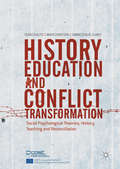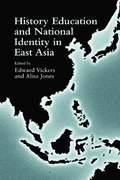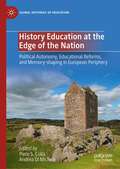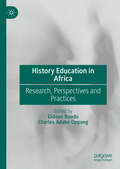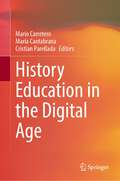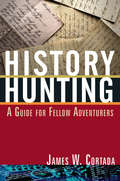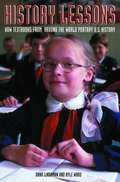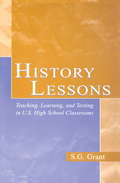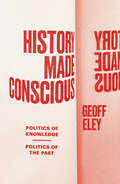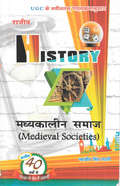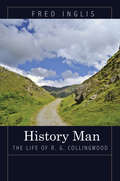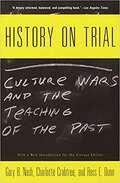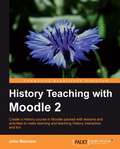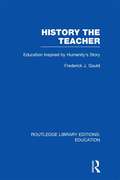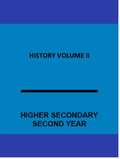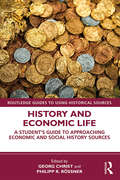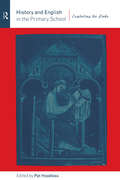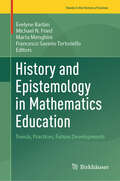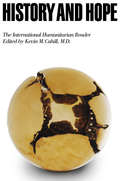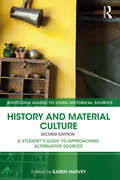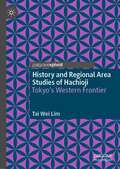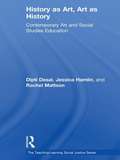- Table View
- List View
History Education and Conflict Transformation
by Mario Carretero Charis Psaltis Sabina Čehajić-ClancyThis book is open access under a CC BY 4. 0 license. This volume discusses the effects, models and implications of history teaching in relation to conflict transformation and reconciliation from a social-psychological perspective. Bringing together a mix of established and young researchers and academics, from the fields of psychology, education, and history, the book provides an in-depth exploration of the role of historical narratives, history teaching, history textbooks and the work of civil society organizations in post-conflict societies undergoing reconciliation processes, and reflects on the state of the art at both the international and regional level. As well as dealing with the question of the 'perpetrator-victim' dynamic, the book also focuses on the particular context of transition in and out of cold war in Eastern Europe and the post-conflict settings of Northern Ireland, Israel and Palestine and Cyprus. It is also exploring the pedagogical classroom practices of history teaching and a critical comparison of various possible approaches taken in educational praxis. The book will make compelling reading for students and researchers of education, history, sociology, peace and conflict studies and psychology.
History Education and National Identity in East Asia: History Education And National Identity In East Asia (Reference Books in International Education)
by Edward Vickers Alisa JonesVisions of the past are crucual to the way that any community imagines itself and constructs its identity. This edited volume contains the first significant studies of the politics of history education in East Asian societies.
History Education at the Edge of the Nation: Political Autonomy, Educational Reforms, and Memory-shaping in European Periphery (Global Histories of Education)
by Piero S. Colla Andrea Di MicheleThis edited volume explores the evolution of history education from a transnational perspective, focusing on border regions in Europe that are considered on the "periphery" of the Nation-State. By introducing this concept and taking into consideration the dynamics of decentralization and the development of minorities’ teaching practices and narratives, the book sheds light on new challenges for history education policy and curriculum design. Chapters take a comparative approach, dissecting and analyzing specific case studies from school systems in France, Germany, Italy, the UK, and Scandinavian countries. In doing so, the editors and their authors weave a systematic account of the impact of local autonomy on educational culture, on the civic remit of schools, and on the narratives embodied by history school canons.
History Education in Africa: Research, Perspectives and Practices
by Gideon Boadu Charles Adabo OppongThis collection brings together African scholars in Africa and the diaspora to contribute to scholarly debates about critical issues in history teaching and learning in African schools. The book contributes to filling the gap in knowledge on African history, associated pedagogies and practices and its consequent effects on research and the declining popularity of history in African Schools. Specifically, the volume (a) examines current trends and practices in history education in African schools, (b) unveils the challenges and subtleties of teaching the next generation of teachers and students, and (c) examines classroom practices and opportunities for engagement with historical concepts in African schools. The book adds a much-needed African voice to the international history education literature and contribute to strengthening the place of history teaching and learning in Africa.
History Education in the Digital Age
by Mario Carretero María Cantabrana Cristian ParelladaThis book reflects on how teachers and students use new technologies in classroom settings in order to improve the capacity of teaching and learning in history to successfully meet the challenges of the twenty-first century through a complex understanding of the relation between past and present. Key authors in the field from Europe and the Americas present a comprehensive overview of the central questions at the heart of the book. They contribute to this process of reflection by taking diverse methodological, pedagogical and conceptual approaches to analyse the ways in which digital tools could advance the development of historical comprehension in the fields of formal and informal history education in different settings as schools, museums, exhibitions, sites of memory, videogames and films.Drawing together a disciplinary diversity that approaches the topic from the viewpoints of collective memory, global history, historical thinking and historical consciousness, the book’s cutting-edge content offers interested academics and practitioners with a broad-based view on the current state of debate in this area, examined via theoretical exploration in-depth case analysis.
History Hunting: A Guide for Fellow Adventurers
by James W. CortadaThe book offers guidance to aspiring historians at every stage and in every walk of life, from practical advice on tackling and organizing projects to recommendations for finding and using resources of all kinds, whether at the local library or historical society or on the world wide web. It is intended to be a serious guide to the best practices for researchers as well as a good read as a collection of research stories. The author includes useful bibliographies, vetted websites, and practical advice on doing research well.
History Lessons: How Textbooks from around the World Portray U.S. History
by Dana Lindaman Kyle WardFrom the book: Instead of avoiding these difficult issues, [students' abilities to discuss and debate historical events] this work embraces them, with the intention of bringing back to the study of history those very things that make it so interesting and important. Instead of just reading about specific events, our readers have the opportunity to develop their own historical perspective and discover how individual biases, perspectives, and interpretations from around the world have shaped our understanding of specific historical events. Library Journal Textbooks are political documents, commissioned methods for molding students' viewpoints as well as instruments for conveying essential facts. By compiling excerpts of secondary-school manuals from largely Anglophone although not exclusively European sources, Ward (history, Vincennes Univ.) and Lindaman (a doctoral candidate at Harvard) provide a valuable service for those largely familiar with U.S. texts only. The use of post-Soviet Russian sources as well as Cuban and North Korean works is especially revealing. After an introduction delineating national differences among foreign publishers and the caveat that "most languages have passive constructions that allow them to speak of something without assigning blame," the authors submit selected historical passages ranging chronologically from the European discovery of the "New World" to the post-Cold War era. The book clearly shows that the United States developed within a global context and that U.S. history was especially intricately intertwined with that of its hemispheric neighbors. That said, there are few new insights for most well-read historians. All the texts assessed are from 1988 through 2001, which necessarily sets this work in time; it would be enlightening to see a similar study done ten years hence. Recommended for public libraries and teachers' college collections.-Frederick J. Augustyn Jr., Library of Congress Copyright 2004 Reed Business Information.
History Lessons: Teaching, Learning, and Testing in U.S. High School Classrooms
by S.G. GrantIn this book, extended case studies of two veteran teachers and their students are combined with the extant research literature to explore current issues of teaching, learning, and testing U.S. history. It is among the first to examine these issues together and in interaction. While the two teachers share several similarities, the teaching practices they construct could not be more different. To explore these differences, the author asks what their teaching practices look like, how their instruction influences their students' understandings of history, and what role statewide exams play in their classroom decisions. History Lessons: Teaching, Learning, and Testing in U.S. High School Classrooms is a major contribution to the emerging body of empirical research in the field of social studies education, chiefly in the subject area of history, which asks how U.S. students make sense of history and how teachers construct their classroom practices. Three case study chapters are paired with three essay review chapters intended to help readers analyze the cases by looking at them in the context of the current research literature. Two concluding chapters extend the cases and analyses: the first looks at how and why the teachers profiled in this book construct their individual teaching practices, in terms of three distinct but interacting sets of influences--personal, organizational, and policy factors; the second explores the prospects for promoting what the author defines as ambitious teaching and learning. Many policymakers assume that standards-based reforms support the efforts of ambitious teachers, but until we better understand how they and the students in their classes think and act, that assumption is hollow at best. This book is a must have for faculty and students in the field of social studies education, and broadly relevant across the fields of curriculum studies and educational policy.
History Made Conscious: Politics of Knowledge, Politics of the Past
by Geoff EleyHow History has changed in the half-century since the 1960sDuring the last fifty years, the writing of history underwent two massive transformations. First, powered by Marxism and other materialist sociologies, the great social history wave instated the value of social explanation.Then, responding to new theoretical debates, the cultural turn upset many of those freshly earned certainties. Each challenge was profoundly informed by politics, from issues of class, gender, and race to those of identity, empire, and the postcolonial.The resulting controversies brought historians radically changed possibilities, expanding subject matters, unfamiliar approaches, greater openness to theory and other disciplines, a new place in the public culture. History Made Conscious offers snapshots of a discipline continuously rethinking its charge. How might we understand "the social" and "the cultural" together? How do we collaborate most fruitfully across disciplines? If we take theory seriously, how does that change what historians do? How should we think differently about politics?
History Madhyakalin Samaj M.A. SEM-I - Kolhan University Chaibasa, Jharkhand: इतिहास लेखन : अवधारणा, विधि एवं साधन एम. ए. – कोल्हान विश्वविद्यालय चाईबासा, झारखंड
by Prof. Mahabir Singh Tyagiविश्वविद्यालय अनुदान आयोग (UGC) द्वारा प्रदत्त मॉडल पाठ्यक्रमानुसार Choice Based Credit सेमेस्टर प्रणाली (CBCS) पर आधारित लोकप्रिय तथा छात्रोपयोगी पुस्तक है। इतिहास मध्यकालीन समाज यह पुस्तक कोल्हान विश्वविद्यालय, चाईबासा झारखंड की एम. ए. 1st सेमेस्टर की कक्षाओं के नवीनतम् पाठ्यक्रमानुसार लघु उत्तरीय तथा वस्तुनिष्ठ प्रश्नोत्तर सहित है। इस पुस्तक में सम्पूर्ण नवीनतम् पाठ्यक्रम, गत वर्षों के सोल्वड पेपर्स, सरल प्रश्नोत्तर रूप और अधुनातम् क्रमबद्ध विषय-सामग्री दी गई है।
History Man: The Life of R. G. Collingwood
by Fred InglisThis is the first biography of the last and greatest British idealist philosopher, R. G. Collingwood (1889-1943), a man who both thought and lived at full pitch. Best known today for his philosophies of history and art, Collingwood was also a historian, archaeologist, sailor, artist, and musician. A figure of enormous energy and ambition, he took as his subject nothing less than the whole of human endeavor, and he lived in the same way, seeking to experience the complete range of human passion. In this vivid and swiftly paced narrative, Fred Inglis tells the dramatic story of a remarkable life, from Collingwood's happy Lakeland childhood to his successes at Oxford, his archaeological digs as a renowned authority on Roman Britain, his solo sailing adventures in the English Channel, his long struggle with illness, and his sometimes turbulent romantic life. In a manner unheard of today, Collingwood attempted to gather all aspects of human thought into a single theory of practical experience, and he wrote sweeping accounts of history, art, science, politics, metaphysics, and archaeology, as well as a highly regarded autobiography. Above all, he dedicated his life to arguing that history--not science--is the only source of moral and political wisdom and self-knowledge. Linking the intellectual and personal sides of Collingwood's life, and providing a rich history of his milieu, History Man also assesses Collingwood's influence on generations of scholars after his death and the renewed recognition of his importance and interest today.
History On Trial: Culture Wars And The Teaching Of The Past
by Gary Nash Charlotte Crabtree Ross DunnIn History on Trial, authors Gary B. Nash, Charlotte Crabtree, and Ross E. Dunn examine the controversy and criticism over how our nation's history should be taught, culminating in the debate about National History Standards. The book chronicles a media war spearheaded by conservatives from National Endowment for the Humanities veteran Lynne Cheney to Rush Limbaugh, posing questions with regard to history as it relates to national identity. What, the authors ask, is our objective in teaching history to children? Is the role of schools, textbooks, and museums to instill patriotism? Do we revise and reinterpret the past to tell stories that reflect present-day values? If so, who should articulate these values? Wonderfully clear, timely in its intentions, History on Trial provides a thoughtful account of the ways in which Americans have, since the beginning of the Republic, perceived and argued about our past.
History Solved Paper I Competitive Exam
by Indic TrustThis is a compilation of questions answer of Civil Service Examination History Solved Paper I.
History Teaching with Moodle 2
by John MannionFollow the creation of a History course with lots of practical examples and screenshots. Each chapter builds on the course and takes you through a different aspect of teaching history using Moodle. All exercises in the book relate to different periods of history and are suitable for all students of high-school age.This book is for history teachers who would like to enhance their lessons using Moodle. It doesn't matter if you haven't used Moodle before; as long as someone has set it up for you, you can get started with the exercises in the book straightaway.
History The Teacher: Education Inspired by Humanity's Story (Routledge Library Editions: Education)
by Frederick J GouldOrganized chronologically this volume examines education in England in the early twentieth century by discussing education through the ages, from pre-history to 1919. The author’s proposals were radical at the time of original education, although they embrace concepts which are now taken for granted in schools: that education of the "whole person" is vital; that the arts should enjoy equal prominence with the sciences; that schools are communities and that the educational experience will be richer for individuals if they work as and for a community.
History Volume 1 class 11 - Tamil Nadu Board - SCERT: வரலாறு தொகுதி 1 தமிழ்நாடு அரசு மேல்நிலை முதலாம் ஆண்டு
by Government Tamil NaduThe subject to be discussed in the lesson is introduced Leads the students to animated audio, video aids for getting experiential learning Provides additional information related to the subject in boxes to stir up the curiosity of students Infographs - Visual representations intended to make the complex simple and make the students grasp difficult concepts easily.
History Volume 2 class 12 - Tamil Nadu Board - SCERT
by Accessable E-Book Production UnitThis History Volume2 the branch of knowledge dealings with past events.a continus,systematic narrative of past events as relating to a particular people,country,period and persons.
History Volume 2 class 12 - Tamil Nadu Board - SCERT: தமிழ்நாடு அரசு மேல்நிலை இரண்டாம் ஆண்டு வரலாறு தொகுதி - 2
by Scertஇந்த வரலாறு புத்தகம் பகுதி இரண்டு முதற் பகுதியின் தொடர்ச்சியாகும். மேலும் வரலாற்று நிகழ்ச்சிகளை மேலும் தெரிந்து கொள்ளலாம்.
History and Economic Life: A Student’s Guide to Approaching Economic and Social History Sources (Routledge Guides to Using Historical Sources)
by Philipp R. Rössner Georg ChristHistory and Economic Life offers students a wide-ranging introduction to both quantitative and qualitative approaches to interpreting economic history sources from the Middle Ages to the Twentieth Century. Having identified an ever-widening gap between the use of qualitative sources by cultural historians and quantitative sources by economic historians, the book aims to bridge the divide by making economic history sources more accessible to students and the wider public, and highlighting the need for a complementary rather than exclusive approach. Divided into two parts, the book begins by equipping students with a toolbox to approach economic history sources, considering the range of sources that might be of use and introducing different ways of approaching them. The second part consists of case studies that examine how economic historians use such sources, helping readers to gain a sense of context and understanding of how these sources can be used. The book thereby sheds light on important debates both within and beyond the field, and highlights the benefits gained when combining qualitative and quantitative approaches to source analysis. Introducing sources often avoided in culturally-minded history or statistically-minded economic history courses respectively, and advocating a combined quantitative and qualitative approach, it is an essential resource for students undertaking source analysis within the field.
History and English in the Primary School: Exploiting the Links
by Pat HoodlessChanges to the primary curriculum over recent years have widened choice for all, yet the current wave of thinking seems determined to retreat 'back to basics'. This vibrant volume examines the many ways in which history can include and complement the teaching of English, to the greater benefit of both. Enthusiastic practitioners explain how lively classroom activities can influence the level of children's literacy, which means that the importance of the basics is recognised without compromising on the choice of subjects open to children. History emerges as a wonderful tool for exploring not only language and literature, but also as a way of stimulating the imagination and encouraging talk. The contributors here are all passionate about this vital link between two complementary subject areas and will convincingly win you over. The book is an invaluable companion for the student teacher, primary teacher and teacher educator.
History and Epistemology in Mathematics Education: Trends, Practices, Future Developments (Trends in the History of Science)
by Michael N. Fried Évelyne Barbin Marta Menghini Francesco Saverio TortorielloThis book explores the evolving relationship between the history and epistemology of mathematics and mathematics education over the past fifty years. Beginning with the international movement that emerged in the 1970s, it celebrates the enduring and expanding role of historical and epistemological perspectives in shaping teaching practices. Organized into seven thematic sections, the volume examines core issues such as how historical and epistemological insights enhance understanding of mathematical concepts, interdisciplinarity as a tool for teaching, and innovative approaches to teacher training. It also delves into the use of historical problems, ancient texts, and textbooks as teaching resources, alongside an analysis of the social and political dimensions of mathematics education. Special attention is given to the impact of the "modern mathematics" reform and its legacy in rekindling interest in the history of mathematics in education. Featuring contributions from diverse geographical and historical contexts, this book is an essential resource for teachers, researchers, and anyone passionate about the rich interplay of history, epistemology, and mathematics.
History and Hope: The International Humanitarian Reader (International Humanitarian Affairs)
by Kevin M. CahillHistory and Hope: The International Humanitarian Reader provides a better understanding—both within and outside academia—of the multifaceted demands posed by humanitarian assistance programs. The Reader is a compilation of the most important chapters in the twelve-volume International Humanitarian Affairs book series published by Fordham University Press. Each selected chapter has been edited and updated.In addition, the series editor, Kevin M. Cahill, M.D., has written, among other chapters, an introductory essay explaining the academic evolution of the discipline of humanitarian assistance. It focuses on the “Fordham Experience”: its Institute of International Humanitarian Affairs (IIHA) has developed practical programs for training fieldworkers, especially those dealing with complex emergencies following conflicts and man-made ornatural disasters.
History and Material Culture: A Student's Guide to Approaching Alternative Sources (Routledge Guides to Using Historical Sources)
by Karen HarveySources are the raw material of History, but whereas the written word has traditionally been seen as the principal source, historians now recognize the value of sources beyond text. In this new edition of History and Material Culture, contributors consider a range of objects – from an eighteenth-century bed curtain to a twenty-first-century shopping trolley – which can help historians develop new interpretations and new knowledge about the past. Containing two new chapters on healing objects in East Africa and the shopping trolley in the social world, this book examines a variety of material sources from around the globe and across centuries to assess how such sources can be used to study the distant and the recent past. In a revised introduction, Karen Harvey discusses some of the principal issues raised when historians use material culture, particularly in the context of 'the material turn', and suggests some initial steps for those unfamiliar with these kinds of sources. While the sources are discussed from interdisciplinary perspectives, the emphasis of the book is on what historians stand to gain from using material culture, as well as what historians have to offer the broader study of material culture. Clearly written and accessible, this book is the ideal introduction to the opportunities and challenges of researching material culture, and is essential reading for all students of historical theory and method.
History and Regional Area Studies of Hachioji: Tokyo's Western Frontier
by Tai Wei LimThis book looks at the case study of Hachioji as a major transit hub with a world-class public transportation system in Japan. It tracks how Tokyo slowly expands into its suburban, rural or sub-rural districts. It also wants to profile the multiple identities of a city that is simultaneously an ecological asset, a heritage locale in addition to a logistics hub. The volume is probably the first of its kind to analyze the western sector of the largest city in the world.
History as Art, Art as History: Contemporary Art and Social Studies Education
by Rachel Mattson Dipti Desai Jessica HamlinHistory as Art, Art as History pioneers methods for using contemporary works of art in the social studies and art classroom to enhance an understanding of visual culture and history. The fully-illustrated interdisciplinary teaching toolkit provides an invaluable pedagogical resource—complete with theoretical background and practical suggestions for teaching U.S. history topics through close readings of both primary sources and provocative works of contemporary art. History as Art, Art as History is an experientially grounded, practically minded pedagogical investigation meant to push teachers and students to think critically without sacrificing their ability to succeed in a standards-driven educational climate. Amid the educational debate surrounding rigid, unimaginative tests, classroom scripts, and bureaucratic mandates, this innovative book insists on an alternate set of educational priorities that promotes engagement with creative and critical thinking. Features include: A thought-provoking series of framing essays and interviews with contemporary artists address the pivotal questions that arise when one attempts to think about history and contemporary visual art together. An 8-page, full color insert of contemporary art, plus over 50 black and white illustrations throughout. A Teaching Toolkit covering major themes in U.S. history provides an archive of suggested primary documents, plus discussion suggestions and activities for putting theory into practice. Teaching activities keyed to the social studies and art curricula and teaching standards Resources include annotated bibliographies for further study and lists of arts and media organizations. This sophisticated yet accessible textbook is a must-read resource for any teacher looking to draw upon visual and historical texts in their teaching and to develop innovative curriculum and meaningful student engagement.
